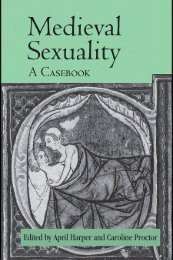Festive Satire: Julian's Misopogon and the New ... - Julian Emperor
Festive Satire: Julian's Misopogon and the New ... - Julian Emperor
Festive Satire: Julian's Misopogon and the New ... - Julian Emperor
You also want an ePaper? Increase the reach of your titles
YUMPU automatically turns print PDFs into web optimized ePapers that Google loves.
sarcastic parody of <strong>the</strong> final greeting traditional in imperial letters.III <strong>Julian</strong> obviously didnot consider it his obligation to keep letters <strong>and</strong> edicts distinct. For example, he wrote to<strong>the</strong> citizens of Bostra in <strong>the</strong> first person singular, combining pungent comments on <strong>the</strong>folly of <strong>the</strong>ir sectarian disputes with accusations of ingratitude, but called his message anedict."" The blurring of literary categories <strong>and</strong> <strong>the</strong> restructuring of <strong>the</strong> imperial role wereequally <strong><strong>Julian</strong>'s</strong> legacy from Constantine. Compare ano<strong>the</strong>r manifesto, both political <strong>and</strong>personal, written for a special occasion, personally delivered <strong>and</strong> widely published, that'fits into no recognizable literary category, for it combines homily, philosophy, apologetic,<strong>and</strong> literary exegesis into an expression of <strong>the</strong> author's personality'. 1 ~ 3Not ano<strong>the</strong>r treatiseof <strong><strong>Julian</strong>'s</strong>, but Constantine's Speech to <strong>the</strong> Assembly of <strong>the</strong> Saints.<strong>Julian</strong> was by no means <strong>the</strong> first emperor to rebuke his subjects in writing for unrulydemonstrations of opinion. Edicts of this type go back to <strong>the</strong> J~lio-Claudians~~~4Provincials did not always go to <strong>the</strong> expense of making permanent copies of edictsaddressed to <strong>the</strong>m, particularly if <strong>the</strong> edict did not work to <strong>the</strong>ir direct advantage or wasdownright unflattering; so by <strong>and</strong> large <strong>the</strong> ipsissima verba of o<strong>the</strong>r angry emperors havenot survived. If we had <strong>the</strong> full text of <strong>the</strong> imperial legislation excerpted for <strong>the</strong>Theodosian Code, we might be more accustomed to <strong>the</strong> spectacle of emperors indulging invehement abuse of <strong>the</strong>ir wayward subjects."s But we do have snippets of information fromhistorians <strong>and</strong> imperial biographies. Augustus replied to insolent popular jokes with anedict;n6 Vindex, in revolt against Nero, issued edicts that referred to <strong>the</strong> emperor as aprivate person <strong>and</strong> insulted his musicianship. Nero, characteristically, fought back withbanquet epigrams, which he set to music with obscene gestures, <strong>and</strong> which are said to haveentered <strong>the</strong> popular repertoire.117 Vespasian answered anonymous lampoons 'such as areusually posted against emperors', with humorous counter-edicts.118 A censorious letterfrom Hadrian stopped riots in Alex<strong>and</strong>ria.119 His spirited exchange of anacreontics with <strong>the</strong>poet Florus makes a good story.IZ0 It might even be true. Certainly <strong>the</strong> motif was worthrecycling.1z1 When <strong>the</strong> senators of Antioch expressed passive resistance to Caracalla, <strong>the</strong>nresident among <strong>the</strong>m, he took time out from dissipation to send <strong>the</strong>m a list of hiscomplaints. Annoyed by <strong>the</strong>ir lack-lustre performance <strong>and</strong> <strong>the</strong>ir unwillingness to assemblewith an appropriate appearance of zeal, he concluded his letter with <strong>the</strong> comment, 'I knowmy behaviour does not please you; that is why I have weapons <strong>and</strong> soldiers, so that I donot have to pay attention to what people are saying about me'.1zzExamples from <strong>the</strong> career of Marcus Aurelius are particularly useful because of<strong><strong>Julian</strong>'s</strong> well-known preference for him.123 <strong>Julian</strong> did more than admire his role-model: hewore Marcus' old-fashioned beard. Macrinus' beard had made <strong>the</strong> same announcement. AsHerodian said of him, 'he wasted his time in Antioch cultivating his beard <strong>and</strong> walkingabout with carriage more stately than was called for . . . in so doing he was imitating <strong>the</strong>111 Instead of E~~TVXE~TEwe find, 'In return for your contains some strongly emotive language. I owe thisgood will <strong>and</strong> <strong>the</strong> honour with which you publicly reference to Judith Evans-Grubbs.honoured me, may <strong>the</strong> Gods pay you back what you "6 Suet. 56. I.deserve' (371C). On <strong>the</strong> persistence of <strong>the</strong> final greeting "7 Suet., Nero 41-2.even in epigraphic copies of imperial letters that omit "8 ~i~6 Tlva ypauucrra, ofa ~ioeav bcvcjvw~a ESo<strong>the</strong>r formal elements, see W. Williams, ZPE 17 (1975)~ sobs airso~prbopa~, ~porqha~1~ubv airrq cpipovra,4'.tithsayua (Ep 41, Wright, 437D <strong>and</strong> C).EEETB~~1~0~6, &VTEEET~~E~ T& TPOD(POP~ uq8b~ TapCXT-~611~~0~ (Dio LXV. I I).1.3 T. D. Barnes, Constantine <strong>and</strong> Eusebius (1981), 1~9Dio LXIX. 8. I.75. Anyone who thinks that passionate invective is a HA. Hadrian xvr. 3-4. sign of an emperor who has lost his grip should compare HA. Macrinus XI. 3-7, XIV. 2-5; Alex<strong>and</strong>er some of <strong>the</strong> letters of Constantine, for example his letter Severus XXXVIII. 3-6, with <strong>the</strong> comments of B. to <strong>the</strong> bishops after <strong>the</strong> Council of Arles (Optatus, Agp. Baldwin, 'Verses in <strong>the</strong> Historia Augusta', BICS 25 v) <strong>and</strong>, most spectacularly, his letter to Arius <strong>and</strong> <strong>the</strong> (1978)y. 52-4. Arians (H.-G. Opitz, Athanasius Werke 11. I, 6~75).lzz Dl0 LXXVIII. 20. 1 ~ 4Augustus: Suet., D.Aug. 42, 53, 56. 1; Tacitus, "3 Ammianus xvr. I. 4, 'congruens Marco, ad cuiusAnn. I. 78; Tiberius: Tacitus, Ann. v. 5; Claudius: aemulationem actus suos effingebat et mores'.Tacitus, Ann. XI. 13; Nero: Tacitus, Ann. XIV. 45; cf. According to Eutropius, who accompanied him toGalba: Suet., Galba 15. 2, Plutarch, Galba 17. 4.Persia, <strong>Julian</strong> was 'Marco Antonino non absimilis, quemlls Some idea of what we have lost can be gleaned etiam aemulari studebat' (x. 16). Cf. <strong><strong>Julian</strong>'s</strong> htter tofrom Diocletian's edict on incestuous marriages, where Themistius 253A Marcus wins <strong>the</strong> palm of imperial<strong>the</strong> full text (preserved in <strong>the</strong> Mosaicarum et virtue in <strong>the</strong> Caesars.Romanarum Legum Collatio VI. 4) is fourteen timeslonger than what remains in <strong>the</strong> Theodosian Code <strong>and</strong>













